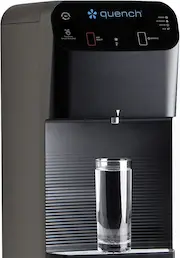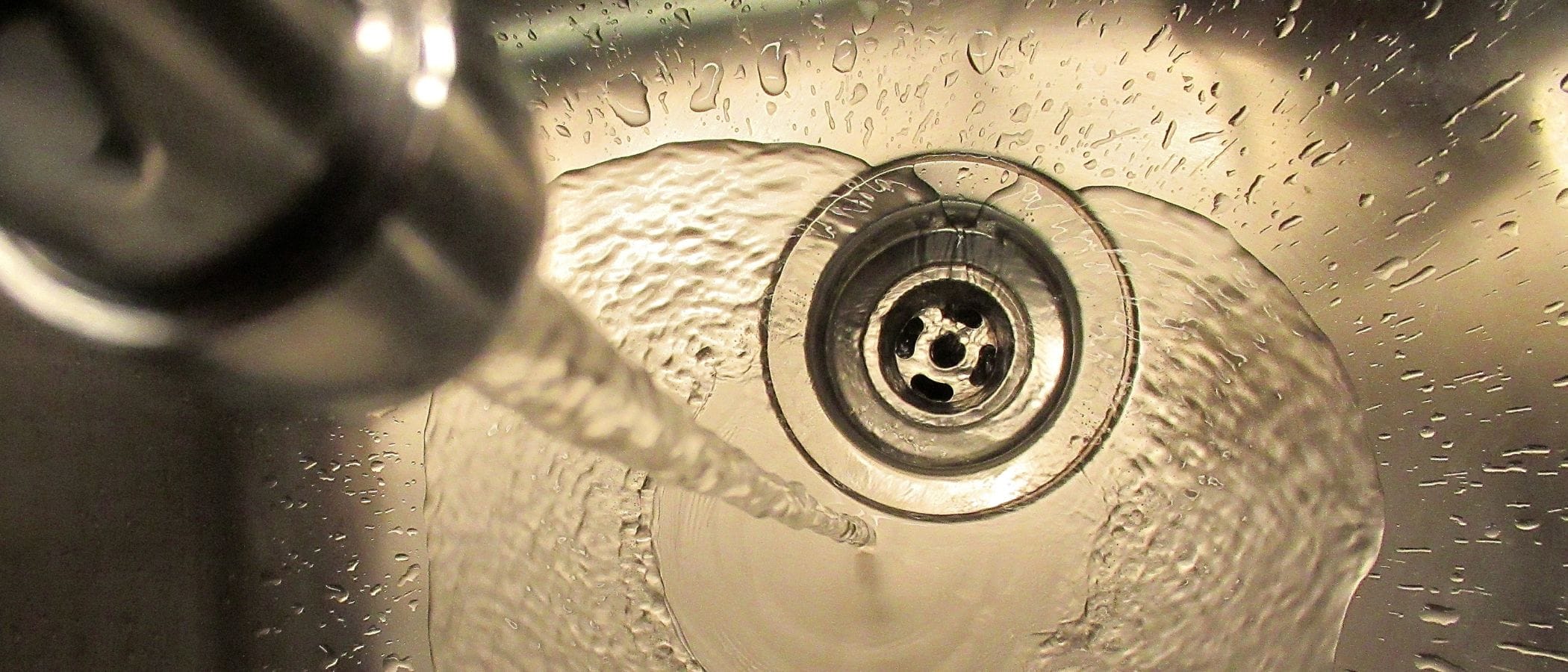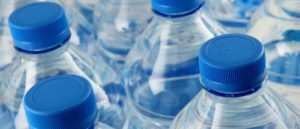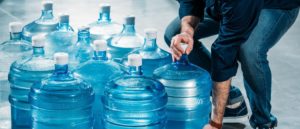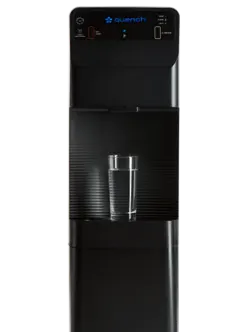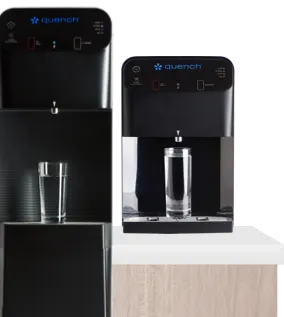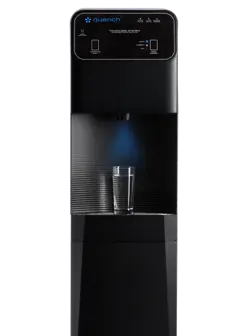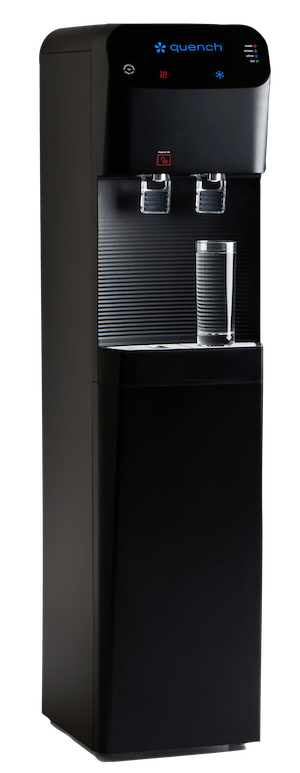It’s easy for companies to rely on traditional tap water sources for convenient hydration. But, whether you realize it or not, your organization’s workplace drinking water source ultimately has a considerable impact on your employees, guests, and customers.
With this in mind, you might be wondering if sink water, or other tap water sources, are safe to drink. And, is this drinking water doing enough to encourage performance and overall productivity? Read on to learn more about the dangers associated with tap water sources and more beneficial alternatives to adequately support the health and hydration of your valuable team members and customers moving forward.
Is Sink Water Safe To Drink At Work?
If you’ve been wondering whether sink water or other tap water sources are safe to drink, you’re not alone. But, the answer is a bit more complicated than it may seem at first glance.
Your sink water at work is a type of tap water source that goes through a filtration process before it gets to your glass. Why? The Environmental Protection Agency (EPA) sets legal limits on over 90 contaminants in drinking water, which include:
- Chemical contaminants: arsenic, chemical, lead, copper, radionuclides, lead, and other chemicals
- Microbial contaminants: coliform, disinfection byproducts, bacteria, parasites, and other pathogens
These limits for contaminated water are set to reflect levels that protect human health long term.
Municipalities are required to adhere to these guidelines, however, there’s an opportunity for cities to set their own standards through the Safe Drinking Water Act. While different public drinking water systems may use distinct water treatment methods to ensure and provide safe drinking water, there are a few general water treatment steps that are used across municipalities. According to the Centers for Disease Control and Prevention (CDC), these include:
- Coagulation
- Flocculation
- Sedimentation
- Filtration
- Disinfection
Although states are required to be in compliance with limits set by the EPA, it’s essential to remember that not all water sources are created equal. For example, your local water quality can have a significant impact on how safe or clean your drinking water actually is after filtration. If you’re in an area with older pipes, certain chemicals can leach into your drinking water. This can also happen in systems that are located near agricultural or industrial runoff areas — which poses a serious threat to the health of your employees and customers.
Overall, limits and regulations set by the EPA exist to ensure our tap water sources are safe to drink. But, they aren’t always effective at reducing contaminants to levels that won’t affect human health as it’s intended.
The Dangers of Drinking Contaminated Sink Water
If your organization currently leverages sink water, or other tap water sources, to hydrate your team members and guests, there are a number of associated, imperceptible dangers that could put them at risk. According to the Environmental Protection Agency, drinking tap water that contains unsafe levels of contaminants can lead to health issues such as:
- Gastrointestinal illness: With tap water, you run the risk of consuming water with disease-causing microbes, which results in stomach pain, vomiting, diarrhea, headache, fever, and kidney failure — where infectious diseases such as hepatitis can also occur.
- Skin discoloration: Exposure to high doses of chemicals in contaminated water can lead to skin discoloration.
- Nervous system or organ damage: Chemical exposure can lead to more severe issues as well, such as nervous system or organ damage and developmental or reproductive effects.
- Cancer: Long-term, low-dose exposure to contaminants and chemicals can lead to chronic, longer-term conditions like cancer.
Keep in mind, the main factors that ultimately influence whether a contaminant will lead to any significant health risk include:
- The type of contaminant
- Its concentration in the water
- Its individual susceptibility
- The amount of water consumed
- The duration of the exposure
How You Can Safely Drink Tap Water at Work
With a better understanding of the true impact sink water can have on employees and customers at work, organizations are quickly turning their attention to bottleless water dispensers that use advanced water filters to elevate their water supply. Whether your business has leveraged tap water sources or a bottled water solution over the years, utilizing a bottleless water cooler and filtration system can give your teams access to cleaner, safer water — better supporting their long-term health and your organizational goals.
With a dependable water service provider, like Quench, your employees can have access to our mineral-infused, electrolyte-enhanced quenchWATER+. With our proprietary 5-filter setup, your water supply goes through:
- A sediment filter: The sediment filter removes large contaminants and dissolved solids larger than 10 microns.
- A pre-carbon filter: With a pre-carbon filter, activated carbon is used to remove anything larger than 5 microns, while attracting and bonding with any positively charged ions in the water to prevent chemical compounds from passing through.
- Reverse osmosis: Through reverse osmosis, pressure is used to force water molecules through a semipermeable membrane removing all contaminants from the water while reducing lead.
- A mineral and electrolyte addback filter: Our FDA- and NSF-certified filter adds essential electrolytes and minerals to the pure reverse osmosis water.
- A polishing filter: Lastly, the polishing filter uses carbon and fine coconut husk fibers to purify the water one last time before it is dispensed into your glass.
This state-of-the-art filtration technology results in crisp, clean, revitalizing alkaline water that tastes great and is more supportive of the well-being of your employees, guests, and customers — effectively reducing any contaminants or chemicals that could be a potential health risk.
Not only does a high-quality water filter ensure your teams have access to great-tasting, clean water, but an elevated water supply can lead to a number of other valuable workplace benefits as well. The top advantages of switching to a bottleless water cooler and filtration system include:
- Healthier employees: The most important benefit of filtered water is driving hydration throughout your workforce and ultimately encouraging the well-being of your workers. Hydration is essential for our bodies to function properly — including regulating body temperature, keeping joints lubricated, preventing infections, delivering nutrients to cells, and more, per a report from the Harvard T.H. Chan School of Public Health. By keeping hydration levels high, you can help ensure your employees are able to reach their full potential in the workplace.
- Increased energy levels and focus in your workforce: According to Healthline, even mild hydration can impair energy levels and lead to major reductions in memory and brain performance. Improving your water supply will prove essential to encourage greater water intake and help your employees maintain energy and focus during the work day.
- Decreased stress levels and boosted satisfaction: Dehydration can cause your blood vessels to constrict which leads to higher levels of stress. Considering a report from the American Institute of Stress which found that 83% of U.S. workers suffer from work-related stress, implementing solutions to drive hydration will be integral to keeping stress levels low. Moreover, water can flush out toxins — which may be culprits of excess stress. As water intake increases, your organization can expect to see happier, less-stressed employees in the long run.
- Greater organizational efficiency and productivity: The health benefits that filtered water can provide for your employees have considerable impacts on your organization’s overall performance. Properly hydrated workers are more likely to stay focused, maintain energy levels, and add to a boosted morale — which will prove invaluable to your efficiency, productivity, and output moving forward.
How Can Quench Make Drinking Water at Work Safe?
Providing tap water or bottled water sources at work likely isn’t leading to proper hydration, and may even become a possible hindrance to your teams if contaminants or chemicals find their way into your water supply. If you’re ready to make the switch to a bottleless water cooler with advanced filtration technology — Quench can help.
With Quench, your organization can explore our broad range of bottleless water dispensers to find a machine that’s the right fit for your company’s water needs. These coolers connect directly to your water line and can be installed virtually anywhere in your workplace, giving your employees and customers easy access to an endless supply of great-tasting water. And, with state-of-the-art filtration, you can rest assured that your drinking water is safe and clean, too. With responsive, reliable service coast to coast, Quench is a partner you can consistently depend on.
Ready to bring your workplace water supply to the next level? Try our product finder to discover the machine that’s best suited for your organization’s water needs, or get a free quote to get started.
